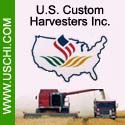 |
 |

|
|
|
National & World Ag News Headlines |
 |
NCBA Hails Introduction of Bipartisan ACRE Act
USAgNet - 03/15/2018
The National Cattlemen's Beef Association (NCBA) today applauded the introduction of bipartisan legislation in the U.S. House of Representatives that would prevent 200,000 farms and ranches from being regulated as if they were toxic Superfund
sites.
The bill, introduced by U.S. Reps. Billy Long (R-Mo.) and Jim Costa (D-Calif.), is known as the Agricultural Certainty for Reporting Emissions (ACRE) Act and is supported by 85 original co-sponsors.
"There's not a lot of bipartisan consensus on Washington, DC, these days, but one thing that a lot of folks on both sides of the aisle can agree on is that the CERCLA law that regulates toxic Superfund sites shouldn't apply to animal agricultural
operations," said fifth-generation California rancher and NCBA President Kevin Kester. "CERCLA was never intended to regulate cow manure, and Congress should fix this situation as soon as possible."
Similar bipartisan legislation - the Fair Agricultural Reporting Method (FARM) Act - was introduced in the U.S. Senate by U.S. Sen. Deb Fischer (R-Neb.) and Joe Donnelly (D-Ind.) on Feb. 13. That bill currently has 37 co-sponsors and could be
marked up by the Senate's Environment and Public Works Committee as soon as next week.
The Comprehensive Environmental Response, Compensation, and Liability Act (CERCLA) was enacted to provide for cleanup of the worst industrial chemical toxic waste dumps and spills, such as oil spills and chemical tank explosions. CERCLA
was never intended to govern agricultural operations, for whom emissions from livestock are a part of everyday life.
To make this clear, in 2008, the Environmental Protection Agency (EPA) finalized a rule to clarify that farms were exempt from CERCLA reporting and small farms, in particular, were exempt from EPCRA reporting, given that low-level livestock
emissions are not the kind of "releases" that Congress intended to manage with these laws.
Upon being sued in 2009 by environmental advocacy groups, the Obama Administration's EPA defended the exemption in court on the grounds that CERCLA and EPCRA do not explicitly exempt farms because Congress never believed that
agriculture would be covered under these statutes, so a specific statutory exemption was not viewed to be necessary.
|
 |


|
 |
|
Copyright © 2024 - Farms.com. All Rights Reserved. |
 |
|